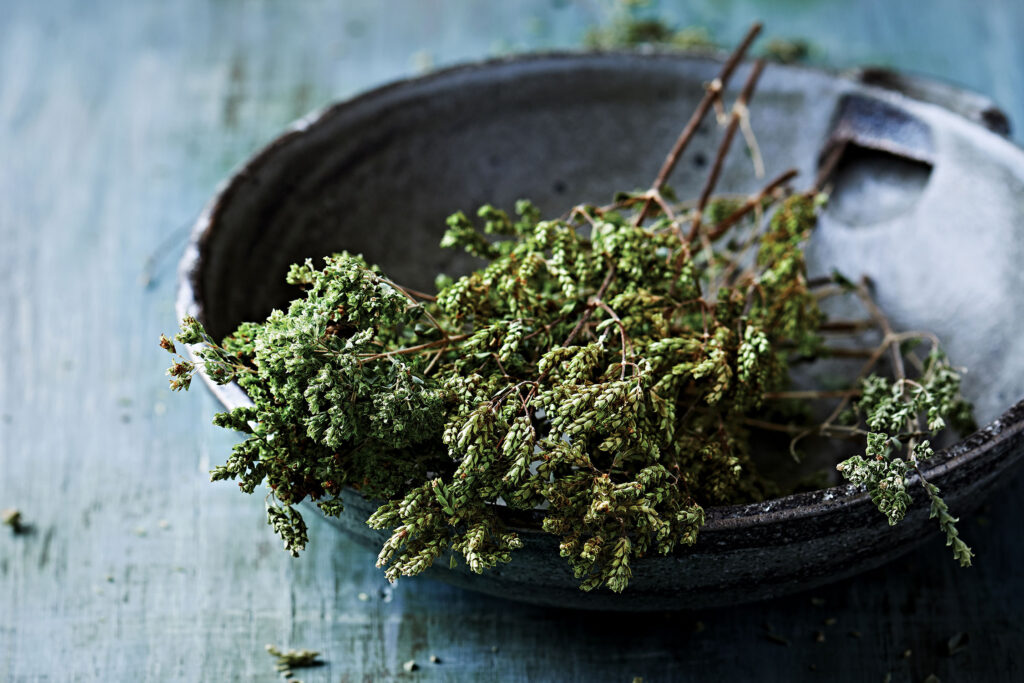Advertisement
Oil of Oregano
From pizza to powerful therapy

Although deliciously well-known for its use in recipes, oregano is actually a potent herb, and oil extracted from it has many therapeutic properties. Oil of oregano has antibacterial, antifungal, antiviral, and potential cancer-preventive properties. Carvacrol, an active ingredient in the oil, is a strong antioxidant.
Advertisement
Cold and flu fighter
Oregano oil has long been used as a remedy for the symptoms of colds, flu, bronchitis, and other respiratory complaints because of its anti-inflammatory, antiviral, and antibacterial properties.
The oil can be used to clear lungs and bronchial passages by mixing with a carrier oil (olive oil) and rubbing it on the chest and aching muscles, by boiling it with hot water, or by adding it to a vaporizer to inhale the steam.
Advertisement
Wound healing
Oregano oil is also used for treating wounds or soothing sore muscles, but be careful to dilute the oregano oil in a carrier oil like olive oil first. You may also be able to buy ointments containing oregano extract which have been shown, in studies, to decrease bacterial contamination and infection on post-surgical wounds.
Advertisement
Antibacterial
Oregano oil possesses a broad spectrum of antimicrobial activity. The compound carvacrol has been shown to help break through the outer cell membranes that help protect bacteria from the immune system. This makes oregano oil a potential therapy in many conditions, including urinary tract infections, food-borne illnesses, and gastric ulcers.
Research says
The oil and its constituents carvacrol and thymol were separately tested on two strains of Staphylococcus bacteria and were found to be bactericidal in culture studies. Other bacteria against which carvarol and thymol have been shown to be effective include E. coli, Campylobacter, Salmonella, Giardia, and Listeria.
Advertisement
Antifungal
Oregano oil is one of nature’s strongest fungal fighters. Candida albicans causes candidiasis, a common human fungal infection, and oregano oil has been found to completely inhibit the growth of C. albicans in culture. This makes oregano oil useful in treating athlete’s foot, fungal infections on the skin and nails, and yeast infections.
Research says
In a 2017 microbiological study, oregano essential oils showed strong antifungal effects against six candida strains. It’s also been used successfully in other studies specifically targeted at finding alternative treatments for vaginal infections. Oregano oil has also been shown to inhibit the growth of Aspergillus flavus and Aspergillus niger, two mold fungi.
Advertisement
Antiviral
Some especially troublesome viral illnesses like norovirus have played havoc in such institutional settings as hospitals and nursing homes, but it’s also created real problems in cruise ships and schools. Now researchers are investigating a possible role for oregano oil in preventing the spread of this nasty virus.
Research says
According to researchers, carvacrol has a unique way of breaking down the norovirus’ external proteins which would allow other antimicrobials to invade the internal part of the virus to kill it.
Advertisement
Anticancer
The more we learn about cancer—its intricacies, its virulence, and its impact on our lives—the more we discover about how to deal with it. New and novel treatments are continually sought out, but one area of research involves the study of essential oils. One of oil of oregano’s main constituents, carvacrol, has shown promise in preliminary research involving several types of cancer.
Research says
Results from a study at Long Island University in Brooklyn, New York, demonstrated the anti-proliferative effects (inhibition of cell growth) of carvacrol on prostate cancer cells. Researchers suggest it may be valuable as a potential therapeutic agent for prostate cancer. Preliminary lab research also shows promise with carvacrol in cell lines from melanoma and cancers of the lung, liver, breast, and cervix.





